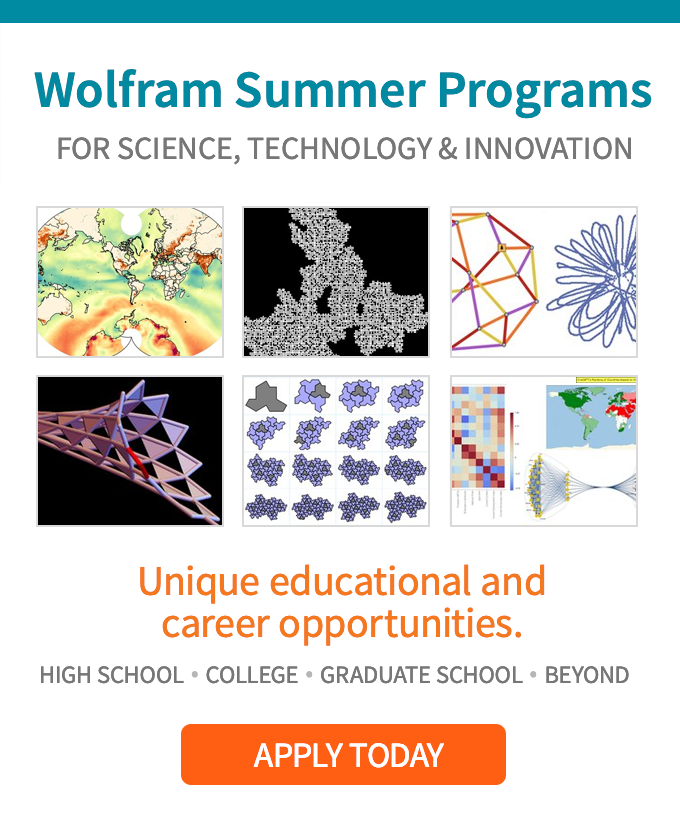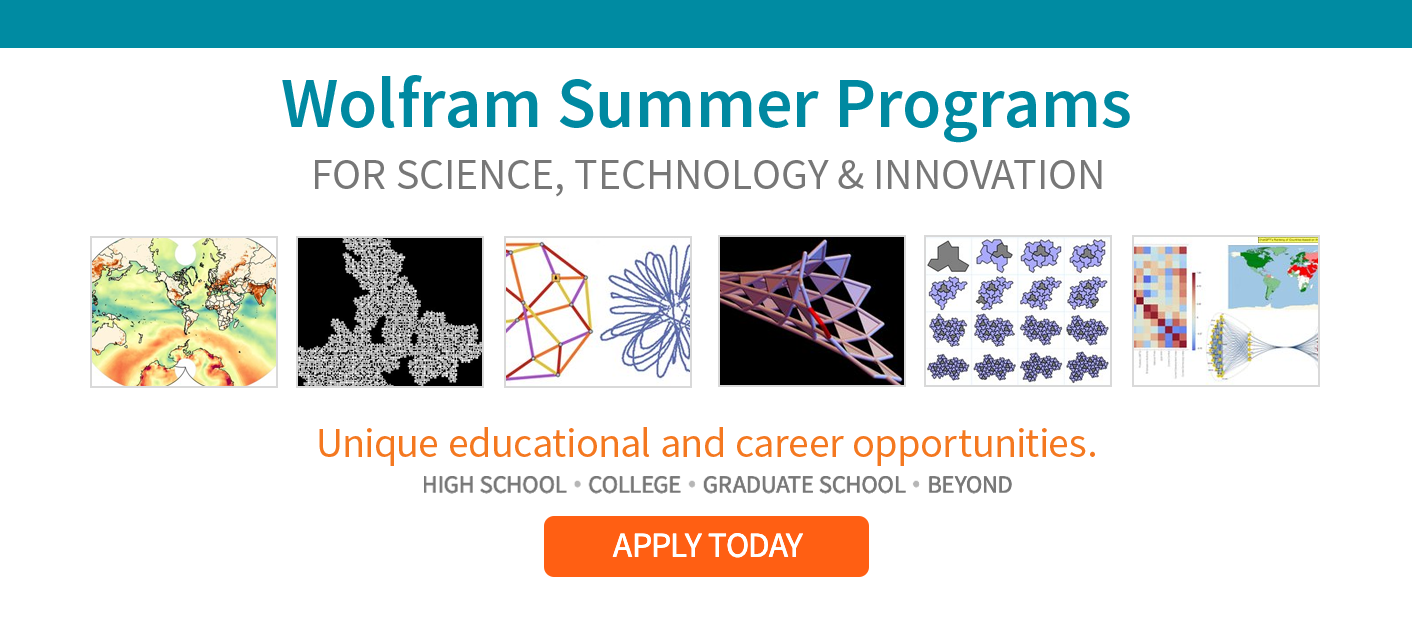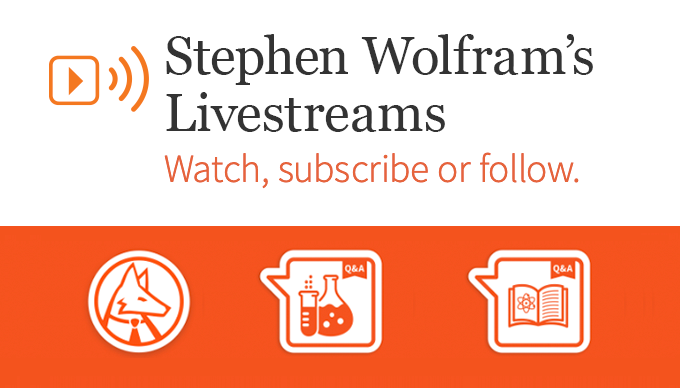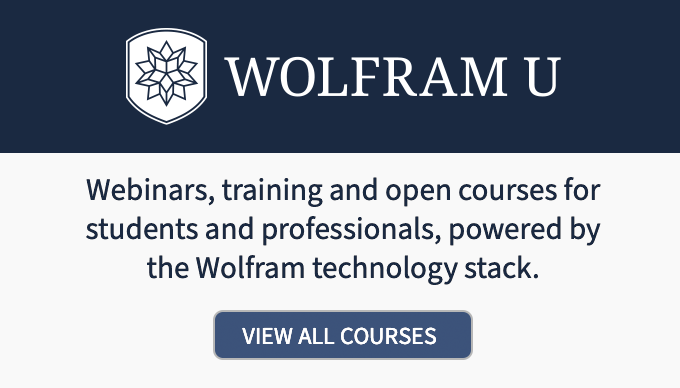January 6–17|Online
Neural Networks Boot Camp
This two-week online boot camp is for anyone who wants to develop proficiency in neural networks and explore ways to apply AI and deep learning for analysis of images, text, audio and video. The boot camp starts with Wolfram Language and Wolfram Notebook basics and teaches you how to use trained and untrained models from the Wolfram Neural Net Repository. Earn Level 1 and Level 2 certifications in neural networks guided by Wolfram experts.
Registration required
January 14|Online
Practical Programming with Wolfram Language
This course provides the knowledge, tools and guidance to efficiently create and maintain Wolfram Language projects. Build on your existing programming skills with a quick review of basic syntax and then develop a deeper understanding of patterns, interactive interfaces and cloud deployment. Learn about coding best practices, including error handling and the use of IDEs. This course is designed for Wolfram Language users who are ready to move beyond the fundamentals and create their own programs and interfaces.
Registration required
January 14|Online
Customizing Mathematica Using Stylesheets
You will learn how stylesheets are used by Mathematica and how to use them to customize the default behavior of cell types, make new cell types and create your own stylesheet from scratch.
Registration required
January 14|Online
Hands-on Start to Wolfram Mathematica Training Tutorials
Get hands-on training directly from the authors of the Hands-on Start to Wolfram Mathematica book! During this one-hour course, you’ll learn how to use Mathematica to create notebooks, enter free-form input in Wolfram Language, perform symbolic and numeric calculations, generate 2D and 3D graphics, create interactive Manipulates, analyze data and share your notebook online or as an interactive presentation.
Registration required
January 15|Online
Introduction to Neural Networks in Wolfram Language
This course provides an introduction to the state-of-the-art Neural Net Framework in Wolfram Language. Learn about the Neural Net Repository and transfer learning, as well as how to train, test and look inside a neural net. Earn a certificate of course completion.
Registration required
January 15|Online
Statistics and Machine Learning: Better Together
Learn how Wolfram Language can simplify handling statistical distributions and make machine learning accessible through automation. This example-driven webinar is geared toward those with basic coding experience and an interest in classical statistics and/or machine learning.
Registration required
January 16|Online
Turn Rough Ideas into Computation with Wolfram Notebook Assistant
Learn how to turn conversational input into precise computational code for accessing the full power of Wolfram Language. This webinar demonstrates ways you can interact with Wolfram Notebook Assistant, showcases examples for writing and fixing code and explains how to take advantage of LLM functionality via Wolfram Language functions.
Registration required
January 21|Online
Programming and Development in Wolfram Language
Learn about advanced programming and development concepts in Wolfram Language. Dive deeper into the fundamentals of expression syntax and function definition. Explore more complex ideas like upvalues, attributes, manual scoping and package creation. This course is the third and final part of the programming proficiency course sequence, following Programming Fundamentals and Practical Programming.
Registration required
January 21| Online
Online
 Online
OnlineVisualisation des données à fort impact
Learn to visualize data structures and prepare graphics for publishing using Wolfram technology–specific functions and general techniques.
Registration required
 Cet événement se déroulera en français.
Cet événement se déroulera en français.
January 22|Online
Wolfram Language and LLMs
Learn how to unlock the power of LLMs for your computational tasks. This course will show you different ways you can use LLM technology alongside Wolfram Language, including how to use the conversational interface of Chat Notebooks and the programmatic operations possible with LLM functions.
Registration required
January 24|Online
Deploying Computational Web Services: Getting Started with APIs, Dynamic Content and Web Apps
Discover how simple it is to create powerful tools and make them available throughout your company or to the wider public using APIs, cloud notebooks, forms and dynamic web content.
Registration required
January 28| Online
Online
 Online
OnlineLa science des données, c’est plus que des statistiques
In this talk, we’ll explore how automation can be used to apply much more sophisticated computation to data in order to achieve deeper insights and derive more value from it.
Registration required
 Cet événement se déroulera en français.
Cet événement se déroulera en français.
January 28|Online
Injecting Reliability Into Generative AI
This talk will explain the problems that large language models (LLMs) have with reliability in factual accuracy, logical thinking and computational tasks. It shows examples of using plugins to inject facts and provide private data and algorithms to LLM answers as well as how to exploit LLM capabilities within Wolfram Language code to solve difficult problems with unstructured data and poorly understood tasks.
Registration required
January 29|Online
Big Problems with Big Data: Managing Risks in AI
Learn to assess whether machine learning is the most appropriate tool to be used for your data-driven decisions by looking at issues such as sources of bias, explainability of models and decision-making criteria.
Registration required
January 29|Online
Hands-on Start to Wolfram Mathematica Training Tutorials
Get hands-on training directly from the authors of the Hands-on Start to Wolfram Mathematica book! During this one-hour course, you’ll learn how to use Mathematica to create notebooks, enter free-form input in Wolfram Language, perform symbolic and numeric calculations, generate 2D and 3D graphics, create interactive Manipulates, analyze data and share your notebook online or as an interactive presentation.
Registration required
January 29|Online
Quantum Algorithms for Real-World Applications
Wolfram and Classiq have partnered to integrate Classiq’s cutting-edge engine into Wolfram Language, offering a unified solution for the development of quantum and classical algorithms. Join this session to see application examples and for an overview of the quantum algorithms used.
Registration required
January 30| Online
Online
 Online
OnlineDébuter avec la géographie : guide du débutant pour travailler avec les SIG, les projections et les primitives
Learn how to create impactful and clear geographic visualizations using Wolfram Language’s geographic visualization libraries, including ways to style content and backgrounds and control map projection options. This free webinar includes a Q&A session with Wolfram experts.
Registration required
 Cet événement se déroulera en français.
Cet événement se déroulera en français.
February 6|Online
Computational Xplorations
This free introductory course demonstrates how to interactively explore nearly any field using computation. See how computational thinking—a modern blend of critical analysis and information processing—is being applied to a range of disciplines not traditionally associated with coding.
Registration required
February 13|Online
Quick Start to Wolfram Tech
This course introduces core technologies for getting started quickly with the Wolfram technology stack. Learn to work with Wolfram Notebooks in the cloud as well as on your desktop and familiarize yourself with the syntax and programming fundamentals of Wolfram Language. This course provides comprehensive instruction guided by a live instructor. No prior experience with Wolfram Language is required. A certificate of course completion is available.
Registration required
February 13|Online
Hands-on Start to Wolfram Mathematica Training Tutorials
Get hands-on training directly from the authors of the Hands-on Start to Wolfram Mathematica book! During this one-hour course, you’ll learn how to use Mathematica to create notebooks, enter free-form input in Wolfram Language, perform symbolic and numeric calculations, generate 2D and 3D graphics, create interactive Manipulates, analyze data and share your notebook online or as an interactive presentation.
Registration required
February 15–28|Online
Daily Study Group: Introduction to Laplace Transforms
This Daily Study Group introduces you to the Laplace transform, its properties and applications, making use of cutting-edge Wolfram Language functions that make Laplace transforms automatically and accurately computable. The lessons used in this Study Group are taken from the upcoming Wolfram U course Introduction to Laplace Transforms.
Registration required
February 20|Online
Data Visualization with Wolfram Language
With the use of a curated dataset from the Wolfram Data Repository, this course shows how to quickly visualize different data structures and how to make your graphics ready to publish and share. Domain-specific functions and general techniques are shared for getting the most out of your graphics.
Registration required
February 25|Online
Hands-on Start to Wolfram Mathematica Training Tutorials
Get hands-on training directly from the authors of the Hands-on Start to Wolfram Mathematica book! During this one-hour course, you’ll learn how to use Mathematica to create notebooks, enter free-form input in Wolfram Language, perform symbolic and numeric calculations, generate 2D and 3D graphics, create interactive Manipulates, analyze data and share your notebook online or as an interactive presentation.
Registration required
March 3–7|Online
Daily Study Group: What Is ChatGPT Doing … and Why Does It Work?
Find out what’s going on inside ChatGPT and explore why it can perform so well at producing meaningful text. This Study Group is based on a best-selling book by Stephen Wolfram and provides an accessible and engaging explanation for the success of ChatGPT. Participants are encouraged to read the book before coming to this Study Group.
Registration required
March 11|Online
Wolfram Notebooks: Building and Sharing Technical Workflows
In this course, you will learn how to create Wolfram Notebooks, interactive and powerful computational documents. This course shows how you can combine Wolfram Language with the notebook interface to express your ideas and develop technical workflows for data science, modeling, research, education and more. Discover how to build rich computational essays and presentations and publish to the cloud. No experience with Mathematica or Wolfram Language is required.
Registration required
March 13|Online
Wolfram Language Programming Fundamentals
This instructor-led session teaches the fundamental concepts of programming in Wolfram Language. It features concise lecture sections, self-check exercises and tips for writing Wolfram Language code. Basic familiarity with Wolfram Language or introductory-level skill in any programming language is recommended. A certificate of course completion is available.
Registration required
March 17–20|Anaheim, CA
American Physical Society Global Physics Summit
Wolfram will be exhibiting at APS. Stop by booth #809 to get your questions answered, to learn about what’s new or just to say hello!
Tradeshow
March 18|Online
Notebooks as Instructional Tools
This course explores the versatility of Wolfram Notebooks for teaching and learning. See how you can use notebooks to learn to code and work with and transfer data, as well as create interactive content to use in instructional environments. No prior experience with Wolfram technology is required. A certificate of course completion is available.
Registration required
March 20|Online
Practical Programming with Wolfram Language
This course provides the knowledge, tools and guidance to efficiently create and maintain Wolfram Language projects. Build on your existing programming skills with a quick review of basic syntax and then develop a deeper understanding of patterns, interactive interfaces and cloud deployment. Learn about coding best practices, including error handling and the use of IDEs. This course is designed for Wolfram Language users who are ready to move beyond the fundamentals and create their own programs and interfaces.
Registration required
March 25|Online
Computational Xplorations
This free introductory course demonstrates how to interactively explore nearly any field using computation. See how computational thinking—a modern blend of critical analysis and information processing—is being applied to a range of disciplines not traditionally associated with coding.
Registration required
March 27|Online
Programming and Development in Wolfram Language
Learn about advanced programming and development concepts in Wolfram Language. Dive deeper into the fundamentals of expression syntax and function definition. Explore more complex ideas like upvalues, attributes, manual scoping and package creation. This course is the third and final part of the programming proficiency course sequence, following Programming Fundamentals and Practical Programming. This course is designed for users who want to take the next step toward mastery in Wolfram Language programming.
Registration required
April 8|Online
Introduction to Machine Learning in Wolfram Language
Gain experience using machine learning superfunctions available in Wolfram Language. This course demonstrates how to perform supervised and unsupervised machine learning tasks and also covers regression, classification, clustering and anomaly detection. Earn a certificate of course completion.
Registration required
April 15|Online
Introduction to Neural Networks in Wolfram Language
This course provides an introduction to the state-of-the-art Neural Net Framework in Wolfram Language. Learn about the Neural Net Repository and transfer learning, as well as how to train, test and look inside a neural net. Earn a certificate of course completion.
Registration required
April 22|Online
Wolfram Language and LLMs
Learn how to unlock the power of LLMs for your computational tasks. This course will show you different ways you can use LLM technology alongside Wolfram Language, including how to use the conversational interface of Chat Notebooks and the programmatic operations possible with LLM functions.
Registration required





